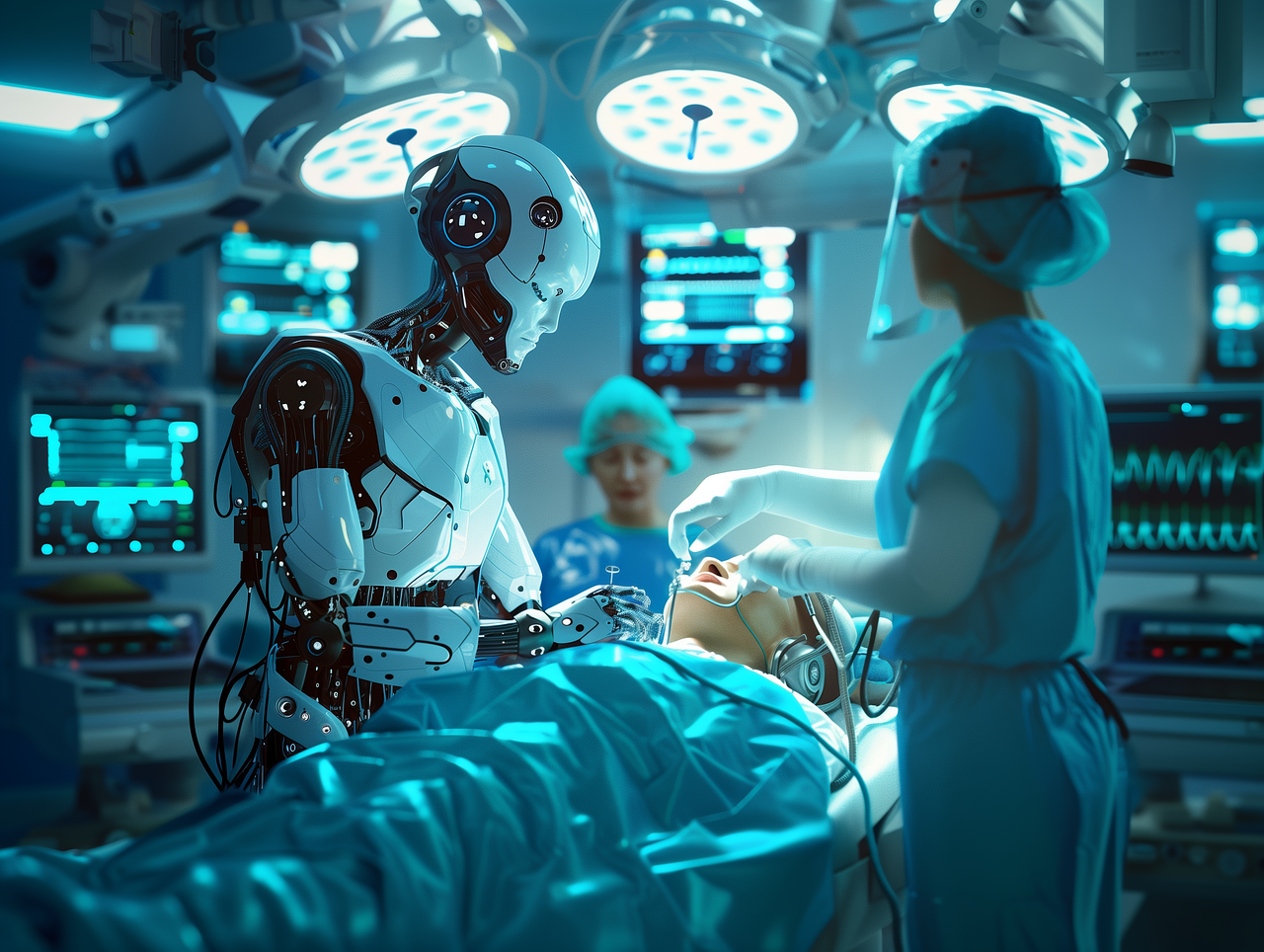Artificial intelligence (AI) is no longer a futuristic concept—it's actively transforming industries today. By automating tasks, improving efficiency, and driving innovation, AI tools are enhancing the way we work, learn, and create. Whether you're in healthcare, education, business, or creative fields, AI offers powerful solutions that are reshaping processes and unlocking new opportunities. In this article, we’ll explore 10 practical AI use cases across various industries, demonstrating how AI is revolutionizing the way we live and work.
1. AI in Healthcare: How AI Tools Revolutionize Diagnostics and Patient Care

AI tools are transforming healthcare, offering cutting-edge solutions for diagnostics, personalized treatments, and improved medical efficiency.
- Medical Imaging: AI tools for medical imaging have drastically improved the speed and accuracy of analyzing X-rays, CT scans, and MRIs. AI-powered algorithms can detect early signs of lung cancer in CT scans, identifying nodules that might be missed by human eyes, leading to earlier detection and potentially life-saving treatment.
- Personalized Treatment: AI tools for personalized treatment analyze a patient’s genomic data, lifestyle, and medical history, helping doctors develop customized treatment plans. This personalized approach ensures more effective treatments with precise dosages tailored to individual needs.
- EHR (Electronic Health Record) Management: AI tools for electronic health record management are automating the tedious process of managing medical records. By analyzing patient data, AI helps identify patterns that aid in diagnosis and treatment planning, improving both efficiency and accuracy.
AI is clearly setting the stage for a new era of precision medicine, making healthcare more effective and accessible.
2. AI in Education: Enhancing Personalized Learning and Streamlining Administration
AI is reshaping education by personalizing learning experiences and automating administrative tasks, giving educators more time to focus on teaching.

- Personalized Learning: AI tools for education like DreamBox and Knewton analyze student performance data to create customized learning paths. These tools adapt lessons in real-time based on a student’s strengths and weaknesses, helping students learn more effectively.
- Automated Grading: AI tools for teachers, such as Gradescope, are automating the grading process, reducing the time spent on routine assessments. This allows educators to focus more on providing meaningful feedback and student development.
- Administrative Efficiency: AI tools for managing administrative tasks streamline processes like scheduling, enrollment, and resource allocation, improving overall efficiency in educational institutions.
By reducing administrative burdens and tailoring learning experiences, AI is enhancing both the learning process and institutional management.
3. AI in Business: Optimizing Operations and Enhancing Decision-Making
AI tools are transforming businesses by optimizing operations, enabling data-driven decisions, and improving recruitment and cybersecurity efforts.
- Automation and Supply Chain Optimization: AI tools for business automation like inventory management and demand forecasting platforms help companies increase efficiency and reduce operational costs. AI-driven platforms predict supply chain disruptions before they happen, allowing businesses to avoid potential delays.
- AI Tools for Project Management: AI tools for project management assist companies in organizing tasks, streamlining workflows, and ensuring that projects are completed on time. These tools also provide predictive analytics to better manage resources and timelines.
AI is helping businesses of all sizes become more efficient and proactive in managing operations, offering a significant competitive edge.
4. AI in Creative Industries: Empowering Creatives and Redefining Content Creation
AI is rapidly changing the creative landscape, offering new possibilities in art, music, film, and design.

- Visual Arts: AI tools are being used to generate, enhance, and manipulate images, allowing artists to explore new digital creation methods. Adobe’s AI-powered Sensei platform, for example, enables creatives to automate repetitive tasks and focus on innovation.
- Music Composition and Production: AI tools like Audiocraft and OpenAI’s MuseNet are democratizing music creation by offering users the ability to compose music with the help of AI. These platforms allow both professional musicians and novices to experiment with complex musical compositions.
- Film and Animation: In the film industry, AI is being used for script analysis and predicting box office success. Cinelytic’s platform allows studios to assess potential risks and rewards for movie projects, helping in decision-making and resource allocation.
AI is not just a tool—it's a collaborator for creatives, enhancing both productivity and artistic potential.
5. AI in Finance: Improving Fraud Detection and Customer Service
The finance sector is increasingly turning to AI for fraud detection, automation, and customer service.

- Fraud Detection: AI-powered algorithms can analyze millions of transactions to identify unusual patterns that might indicate fraudulent activities. FICO’s AI platform is an example of how financial institutions are using AI to combat fraud in real-time.
- AI-Driven Customer Service: AI-powered chatbots, like those offered by Intercom, are transforming customer service by providing instant responses to common queries. This allows banks to offer 24/7 support without needing a human agent.
AI is enabling financial institutions to provide better security and faster customer service, enhancing the overall client experience.
6. AI in Marketing: Data-Driven Campaigns and Content Personalization
AI is playing a critical role in helping marketers design more effective campaigns through data analysis and personalized content delivery.
- Targeted Advertising: AI tools like Google's AdSense analyze user data to serve highly targeted ads, improving conversion rates and reducing advertising waste.
- Content Personalization: Platforms like HubSpot use AI to analyze customer behavior, allowing businesses to deliver personalized content and recommendations based on real-time interactions.
AI’s ability to analyze vast amounts of data and deliver personalized experiences is transforming the way marketers engage with their audiences.
7. AI in Retail: Enhancing Customer Experience and Sales Optimization
Retailers are increasingly relying on AI to improve customer experiences and streamline inventory management.

- Product Recommendations: AI-driven recommendation engines, like those used by Amazon, analyze customer behavior to suggest products, leading to more personalized shopping experiences and increased sales.
- Inventory Management: AI tools help retailers optimize stock levels and prevent shortages by forecasting demand trends. For instance, Clear Demand uses machine learning algorithms to adjust pricing and inventory in real-time.
AI’s ability to predict customer preferences and manage inventory in real-time is helping retailers stay ahead in a competitive market.
8. AI in Human Resources: Streamlining Recruitment and Employee Management
AI tools are transforming how companies manage talent, from hiring to employee retention.
- Recruitment: AI recruitment platforms like Lever help businesses automate the hiring process by scanning resumes, assessing candidates’ skills, and scheduling interviews, improving both efficiency and candidate experience.
- Employee Engagement: AI tools can analyze employee performance and engagement data to identify potential issues before they escalate. Platforms like Peakon use AI to deliver insights that help HR teams improve employee satisfaction and productivity.
AI’s impact on human resources is helping companies find and retain top talent while improving employee satisfaction.
9. AI in Agriculture: Optimizing Farming Practices and Yield
AI is becoming essential for modern farming by optimizing resources and improving crop yield.

- Precision Agriculture: AI tools, like John Deere’s AI systems, are used to monitor soil health, weather conditions, and crop growth, enabling farmers to maximize productivity and reduce waste.
- Automated Harvesting: AI-driven robots and drones can assist with harvesting crops, analyzing crop health, and managing pest control. For example, Blue River Technology uses AI to help farmers monitor their fields and apply herbicides only where needed, reducing costs and environmental impact.
AI’s role in agriculture is boosting efficiency while ensuring more sustainable farming practices.
Conclusion: The Expanding Impact of AI Across Industries
As AI tools continue to evolve, their applications are becoming more advanced and widespread across industries. From revolutionizing healthcare to optimizing business operations, AI is driving unprecedented efficiency and innovation.
The potential for AI tools to impact established industries and emerging fields will only grow as these technologies develop. This presents exciting opportunities for businesses and individuals alike to leverage AI for solving complex problems and improving productivity.
Interested in how AI can transform your industry? Subscribe to our newsletter for the latest updates on AI-driven innovations!
Join Our Community
Be the first to get exclusive updates, insights, and tech tips from our vibrant community. Join us to stay ahead in the tech world!
